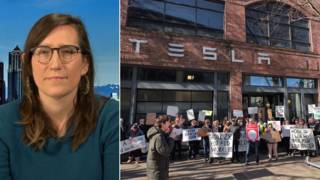HeadlinesJune 17, 2014
U.S. to Deploy 275 Military Personnel to Iraq; ISIS Advances
President Obama has announced plans to deploy about 275 U.S. military personnel back to Iraq amidst a widening crisis. In a letter to congressional leaders, Obama said the force will protect U.S. citizens and be equipped for combat. In their latest advance, Sunni militants from the Islamic State of Iraq and Syria have attacked and briefly taken control of parts of the city of Baquba, less than 40 miles from Baghdad. The Obama administration is reportedly weighing other options in Iraq, including drone strikes and the deployment of special forces to train Iraqi troops. The United States and Iran have spoken briefly about the crisis, but State Department spokesperson Jen Psaki ruled out any joint military action.
Jen Psaki: “I would remind you that we’ve had similar conversations in the past with Iran regarding Afghanistan. These consultations would be along those lines. We’re not talking about coordinating any military action in Iraq with Iran. We would encourage Iran to push the Iraqis to act to address problems in a nonsectarian way.”
We’ll have more on Iraq after headlines.
200 Palestinians Arrested in Israeli Crackdown over Missing Teens
Israeli forces have continued to round up scores of Palestinians as part of a hunt for three teenagers who went missing in the West Bank. In total, more than 200 Palestinians have been arrested. Israel has accused Hamas of kidnapping the three young men and has launched a massive crackdown on the group — although it has yet to provide proof. Secretary of State John Kerry has backed Israel’s claims, saying “many indications point to Hamas’ involvement” in what he called “a despicable terrorist act.” One of the teens, Naftali Frankel, is a dual U.S.-Israeli citizen. At least one Palestinian has been killed and another shot and injured amidst the search.
Obama to Sign Executive Order on LGBT Job Discrimination
The White House says President Obama will sign an executive order banning discrimination against LGBT employees of federal contractors. The order will impact an estimated 14 million employees. Obama has previously held off on signing such an order, instead pressing Congress to pass the more comprehensive Employment Nondiscrimination Act, but that bill has stalled in the Republican-controlled House.
3 States Set to Execute Prisoners amid Drug Secrecy
Georgia is set to execute a death row prisoner this evening using a single dose of pentobarbital from a secret source. On Monday, a federal judge rejected Marcus Wellons’ argument that the secrecy violates his rights and could cause undue suffering. Unless a court issues a reprieve, Wellons will become the first prisoner executed in the United States since the botched execution in Oklahoma of Clayton Lockett, who writhed, groaned and took 43 minutes to die. Initial findings from an independent autopsy released last week found the execution team failed to properly place Lockett’s IV. Two other executions are planned for Wednesday in Florida and Missouri — two states that also conceal the sources of their lethal drugs.
Supreme Court Rules in Favor of “Vulture Funds” in Argentina Debt Case
The U.S. Supreme Court has rejected an appeal from Argentina over its $1.5 billion debt in a ruling critics say validates predatory behavior by so-called “vulture funds.” The case involves hedge funds that bought up Argentina’s debt at bargain rates after its financial crisis more than a decade ago. After Argentina defaulted on its debts, the vast majority of its creditors agreed to slash the value of their holdings. But NML Capital and other firms refused to accept the deal, instead seeking full repayment. Monday’s ruling leaves in place a lower court decision ordering Argentina to pay the companies. Argentine President Cristina Fernández de Kirchner addressed the nation after the ruling.
President Cristina Fernández de Kirchner: “I think that you need to distinguish between what is a business and what is an extortion. I think there are two concepts that are completely different. All the government, all the country, all the directors, in the areas of the environment and policies, need to be open to negotiating. What no president can do in a sovereign country is to subject its country, its people to extortion.”
In a statement, the anti-poverty network Jubilee USA called the court ruling “a devastating blow,” saying, “These hedge funds are equipped with an instrument that forces struggling economies into submission.”
Court Allows Anti-Choice Group to Challenge Ohio Ban on Political Lies
In a decision Monday, the U.S. Supreme Court ruled an anti-choice group can challenge an Ohio law banning false statements about political candidates. The case involves a 2010 attempt by the Susan B. Anthony List to put up billboards accusing an anti-choice congressmember of backing taxpayer funding for abortion, because he supported Obamacare. Federal law actually bars federal funds from being used to pay for abortions. The Supreme Court did not weigh in directly on the Ohio law, instead sending the case back to a lower court.
In Narrow Ruling, Court Rules Against “Straw Buyer” in Gun Case
The U.S. Supreme Court also issued a narrow 5-to-4 ruling related to gun control, upholding the strict application of laws that ban so-called “straw purchasers” from buying a gun for someone else, even if the receiver can legally own a gun. The case concerned a former police officer who bought a gun for his uncle but signed paperwork claiming he was the “actual buyer.” Writing for the majority, Justice Elena Kagan said: “No piece of information is more important under federal firearms law than the identity of a gun’s purchaser.”
GM Announces New Recall of 3.4 Million Vehicles
General Motors has announced a new recall of 3.4 million vehicles, saying the cars can shut off if their keys are jarred while bearing extra weight. Ignition problems in other vehicles have already been linked to at least 13 and perhaps hundreds of deaths. The move brings GM’s total number of recalled vehicles this year to more than 20 million worldwide.
Nebraska: 1 Dead, Town Devastated in Twin Tornadoes
In Nebraska, a child has died and at least 16 people have been critically injured after two tornadoes touched down within about a mile of each other. A local official told the Associated Press, “More than half of the town [of Pilger] is gone — absolutely gone.”
Egypt to Release Hunger-Striking Al Jazeera Journalist Abdullah Elshamy
In news from Egypt, the prosecutor general has ordered the release of Al Jazeera Arabic journalist Abdullah Elshamy, citing Elshamy’s failing health after 10 months in prison and nearly five months on hunger strike. Elshamy was arrested after covering a crackdown on a sit-in by supporters of ousted President Mohamed Morsi. He was one of 13 people ordered released Monday on medical grounds. His brother, Mohammed Elshamy, spoke to Democracy Now! on Monday after receiving the news.
Mohammed Elshamy: “My brother Abdullah started a hunger strike last January, demanding his freedom or being sent to trial, because he has not been on trial for 10 months. He lost more than 35 kilograms of his weight, and his health was deteriorating for the last month, and he had a blood test that said he had anemia and beginnings of kidney failure. He’s in jail since August 2013, and of course him being released after all this time and after going into hunger strike and all the problems he’s been through because of the hunger strike, like being transferred to solitary confinement, and him finally to be released in a few hours is an excitement for me, for the whole family, for everyone who knows him or even just heard about his case. It’s a wonderful day and time for everyone, and everyone is happy.”
Abdullah Elshamy’s release papers have reportedly been signed, and he could be out later today. His brother Mohammed also voiced hope his release would help three Al Jazeera English journalists — Peter Greste, Baher Mohamed and Mohammed Fahmy — who remain behind bars following their arrest in December. An Egyptian judge said Monday he will announce the verdict in their case on June 23 — next Monday. Click here to see our full interview with Mohammed Elshamy.
Most popular
- 1
- 2
- 3
- 4
Non-commercial news needs your support
Please do your part today.











Media Options